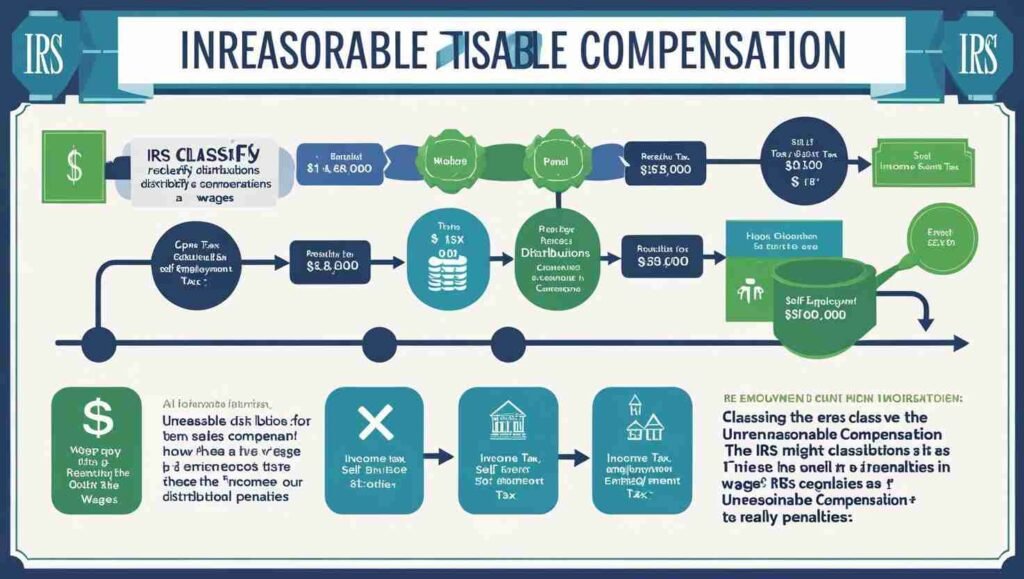Setting reasonable compensation is critical for S-corporation owners to avoid IRS penalties and audits. Incorrect compensation can lead to reclassified distributions, additional taxes, and costly penalties. This article explores common mistakes, IRS audit triggers, and practical steps to ensure your salary complies with regulations, helping you protect your business and finances.
Why Reasonable Compensation Matters
As outlined in What is Reasonable Compensation for S-Corporation Owners?, reasonable compensation is the salary an S-corp owner pays themselves for services, comparable to market rates. Paying an appropriate salary prevents the IRS from reclassifying distributions as wages, which would incur payroll taxes, penalties, and interest. Proper compensation also supports tax optimization by balancing salary and distributions.

Common Mistakes S-Corp Owners Make
S-corp owners often make errors that increase audit risk:
- Not Paying a Salary: Taking only distributions to avoid payroll taxes is a major red flag.
- Paying Too Low: A salary significantly below market rates for your role can trigger scrutiny.
- Using Arbitrary Formulas: Rules like the 60/40 split (60% salary, 40% distributions) are not IRS-approved and may not hold up.
- Lack of Documentation: Failing to document how you determined your salary weakens your defense in an audit.
IRS Audit Triggers
The IRS looks for patterns indicating unreasonable compensation, including:
- Zero or Low Salary with High Distributions: Taking large distributions without a salary or with a minimal salary is a common audit trigger.
- Inconsistent Salary Payments: Irregular or sporadic payments suggest non-compliance.
- Salary Not Matching Role: A salary that doesn’t align with industry standards for your duties can raise concerns.
For example, in David E. Watson, PC vs. U.S. (2012), an Iowa CPA’s $24,000 salary with $220,000 in distributions was deemed unreasonable, leading to $175,000 reclassified as salary with additional taxes and penalties.
Penalties for Unreasonable Compensation

If the IRS determines your salary is too low, they may reclassify distributions as wages, subjecting them to:
- Employment Taxes: Social Security (12.4%) and Medicare (2.9%) taxes on reclassified amounts.
- Failure to Deposit Penalty: Up to 10% of unpaid taxes for deposits more than 15 days late, per IRS Failure to Deposit Penalty.
- Interest: Compounded daily on unpaid taxes, increasing the total owed.
- Accuracy-Related Penalties: Up to 20% of the underpayment if due to negligence or disregard of rules.
These penalties can be substantial, making compliance essential.
How to Avoid Penalties
To minimize audit risk and penalties, follow these steps:
- Set a Reasonable Salary: Use market data to determine a fair salary, as detailed in How to Calculate Reasonable Compensation: A Step-by-Step Guide.
- Pay Consistently: Treat your salary like any employee’s, with regular payroll deposits.
- Document Thoroughly: Keep records of salary research, job descriptions, and decision-making processes.
- Review Annually: Adjust your salary as your business and role evolve to reflect current market rates.
Documentation Tips
Strong documentation can protect you during an audit. Include:
- Salary Research: Save data from sources like BLS, Glassdoor, or RCReports.
- Job Description: Detail your duties and responsibilities.
- Time Logs: Record hours worked, especially if part-time.
- Board Minutes: If applicable, document salary decisions in board records.
Example: Avoiding Penalties
Consider an S-corp owner running a consulting firm with $150,000 in profits. They research and find that consultants in their area earn $80,000 on average (per BLS). They set a $80,000 salary, document their research, and pay it consistently. This approach reduces audit risk compared to taking a $20,000 salary with $130,000 in distributions, which could trigger IRS scrutiny.
Use Our Calculator for Compliance
Our Reasonable Compensation Calculator helps you set a salary that aligns with IRS expectations, reducing penalty risks. Enter your role and industry to get a tailored estimate.
For insights on industry-specific salaries, see Reasonable Compensation Across Different Industries.
External Resources
- IRS: S Corporation Compensation and Medical Insurance Issues
- IRS: Failure to Deposit Penalty
- Journal of Accountancy: Helping S Corporations Avoid Unreasonable Compensation Audits
Conclusion
Avoiding IRS penalties requires setting a reasonable salary, paying it consistently, and documenting your process. By using market data and tools like our calculator, you can ensure compliance and focus on growing your business without the worry of audits or penalties.